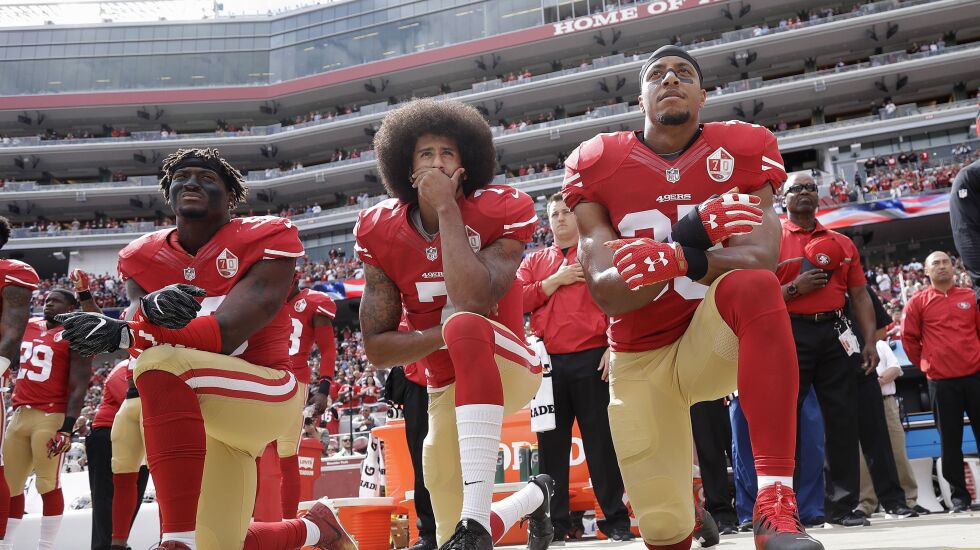
Colin Kaepernick’s graphic novel, “Change the Game,” will be released in early March and will chronicle his coming of age and, importantly, his decision early in life to stay true to his values, despite influence and pressure from others.
With a simple gesture during his professional career — taking a knee during the national anthem at the start of an NFL game to protest police brutality and racial inequality — Kaepernick demonstrated the power, and risk, of standing alone. His action led to intense public scrutiny and criticism, after which he became a free agent and remains unsigned by any professional football team to this day.
News of Kaepernick’s upcoming novel caught my interest because I have been reflecting on what it takes to stand alone — to champion a position and courageously face the opposition. I have also wondered why standing alone seems to be a trait that is in short supply these days.
With precious few exceptions, the trait has been excised from those who serve in our government. Too many public officials are more concerned with keeping their jobs than doing their jobs, or advancing their position for personal gain.
Many in government stand idly by while morally corrupt policies and practices are fomented. They contort, as justifiable or misunderstood, the illicit behavior of those seeking to do harm to individuals and institutions. They conveniently ignore counter- positions they once held. Think Kevin McCarthy, the new U.S. House speaker.
Similarly, corporations and institutions have become breeding grounds for group-think. Board members accept perspectives or decisions, whether or not they believe them to be valid or not. Some even shun their roles as fiduciaries as they rake in six-figure payments for their service. Think Theranos, the failed blood-testing company.
Admittedly, it is easier to get along if one goes along. It is uncomfortable, if not downright lonely, to go against the grain. The risk of standing alone can have painful or risky consequences.
Yet, the ability to stand alone is an absolute necessity for the preservation of democracy, civility, truth and equality in our society.
History has shown that those who stood alone have had an outsized and demonstrable effect on outcomes — inciting movements, swaying popular opinion, exposing wrongdoing and saving lives.
For higher reasons
The theory of moral conation — the inclination or motivation to act morally or ethically — explains why some individuals have the capacity to stand alone and others do not. According to this theory, the motivation to act morally requires three conditions. First, moral ownership — a sense of responsibility to take action. Second, moral efficacy — a feeling of competency to act. Third, moral courage — the strength to commit and persist even in the face of risk or mounting pressure.
Former U.S. Rep. Liz Cheney’s courage to stand alone not only cost her a high-level position in her political party’s leadership — it eventually cost her a re-nomination to run for Congress. As vice chair of the House select committee investigating the Jan. 6 insurrection, Cheney angered her Republican colleagues, who resented her opposition to former President Donald Trump.
Yet Cheney remained unbowed. “It is the most important thing I’ve ever done professionally,” she said in 2021, “and maybe the most important thing I’ll ever do.”
When asked by ESPN to reflect on his actions, Kaepernick explained: “This stand wasn’t for me. This stand wasn’t because I feel like I’m being put down in any kind of way. This is because I’m seeing things happen to people that don’t have a voice, people that don’t have a platform to talk and have their voices heard, and effect change.”
The courage to stand alone — to take the moral and ethical high ground — is done for reasons greater than one’s self.
We would all do well to remember what Dr. Martin Luther King, Jr. said the day after Bloody Sunday in Selma, Alabama in 1965: “A man dies when he refuses to stand up for that which is right. A man dies when he refuses to stand up for justice. A man dies when he refuses to take a stand for that which is true.”
King recognized that those who do not stand for what is right die a death of connectedness to values and principles that matter.
Stephanie Bradley Smith is vice president and chief human resources officer at DePaul University, where she is also an adjunct business professor. She is a Public Voices Fellow with The OpEd Project.
The Sun-Times welcomes letters to the editor and op-eds. See our guidelines.
The views and opinions expressed by contributors are their own and do not necessarily reflect those of the Chicago Sun-Times or any of its affiliates.







